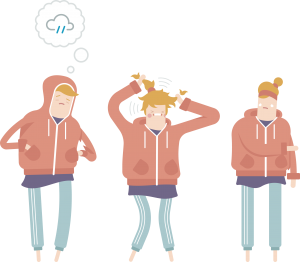Stress Survival Guide: Part 1 – Good Stress, Bad Stress
Stress affects all of us at some points in our lives – whether you’re a student about to sit exams, a graduate attending a job interview, or a seasoned professional preparing for a big presentation.
A small dose of stress can actually be helpful – it’s that all-important motivator, the crucial kick up the arse that turns us LastMinuteDotCommers into JustinTimers! The adrenaline rush that keeps us energised, at the top of our game. But too much stress has the opposite effect, it can be totally debilitating. So how can we harness the good and banish the bad?
You might have watched the thought-provoking BBC documentary ‘The Truth About Stress‘? (1) We looked at their findings and also consulted a wide range of final year students, recent graduates, business executives, creative professionals and youth counsellors. We have included their best tips and information in our Stress Survival Guide.
Good Stress, Bad Stress
Stress is part of modern life, triggered by a wide range of experiences.
Acute stress
Acute stress is our natural survival reaction to situations that involve novelty, unpredictability, a threat to the ego (questioning our competence), or a sense of lack of control e.g. exams, public speaking, interviews. (2)

What happens? Exposure to these perceived threats triggers our ‘fight or flight’ response, releasing a flood of stress hormones, which enable our mind and body to work better and faster, so we can deal with whatever we’re facing: e.g. breathing faster gets more oxygen to the brain so we can think more clearly, our heart rate increases, blood pumps faster and blood sugar levels rise, so our muscles work more efficiently etc.
You’ll be familiar with the physical symptoms: you feel pumped and hyper alert, heart pounding, fast breathing, maybe sweaty palms, dry mouth, butterflies and churning stomach – these are all signs our stress hormones are working well. The right amount of stress means we feel challenged but not overwhelmed by a situation, and it will sharpen our performance.
But too much stress is counter-productive. The BBC documentary showed how the rational part of the brain is hijacked by the primal part, which means our ability to think clearly is overwhelmed by our emotional response. (1) You know that tense panicky feeling when you can’t think straight, can’t remember a thing, unable to focus on the task in hand – brain freeze! Aaaaagh! 😮 At worst, this may mean you lose control, freak out, or have a total meltdown. But as we discover tomorrow, we can change how we deal with stress to prevent this sort of reaction.
Acute stress is a positive force – it pushes you out of your comfort zone, but in a good way, because it produces the drive and energy to get you through tough situations. It doesn’t last long and it happens infrequently.
Chronic stress
But prolonged or repeated exposure to triggers can lead to the overproduction of stress hormones, tipping over into chronic stress. This type of stress has a negative impact on the mind and body. Suffering emotional pressure for lengthy periods, and believing you have little control over the situation, is exhausting and debilitating. Chronic stress can interfere with everyday life and may lead to serious health problems, such as a weakened immune system, high blood pressure, anxiety and depression. (3)

Common symptoms of chronic stress:
Constantly worrying or feeling anxious
Feeling irritable, frustrated, sad or empty
Lacking energy or losing interest in things you used to enjoy
Problems with concentration, sleeping or appetite
Migraines, headaches, dizziness or unexplained aches and pains
So whilst it’s normal to feel a bit anxious sometimes, it’s important to know your own limits. Protect yourself by recognising the signs of more extreme stress early on, take steps to reduce stress levels, and get support.
Find out more on dealing with stress:
Stress Survival Guide:
Part 2 – Get the Best out of Stress
Stress Less
How to recognise the signs of stress & find ways of coping
SOS Professional Help
If you need help or just want to talk, click here for professionals & organisations experienced in supporting young people
Grad Bites: Dealing with Stress – Mindfulness
Claire Derry (business coach) talks about how mindfulness & meditation have helped her deal with some particularly stressful times in her life
Hump Day Help
Helpful resources to boost your mood when things are tough
Sources:
(1) The Truth About Stress BBC One (10 May 2017)
(2) Centre for Studies on Human Stress (CSHS)
(3) Helpguide – Stress Symptoms, Signs, and Causes

Please log in or sign up to comment